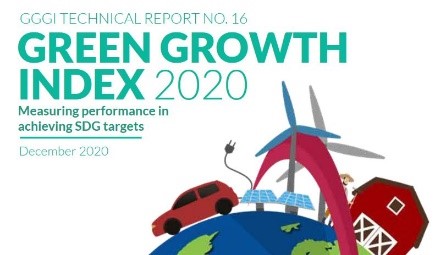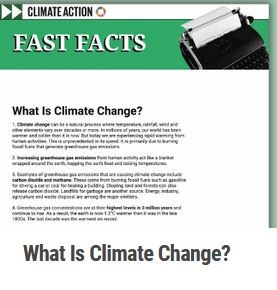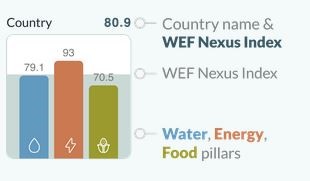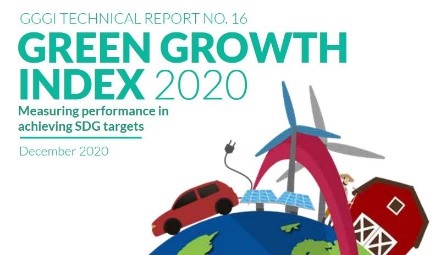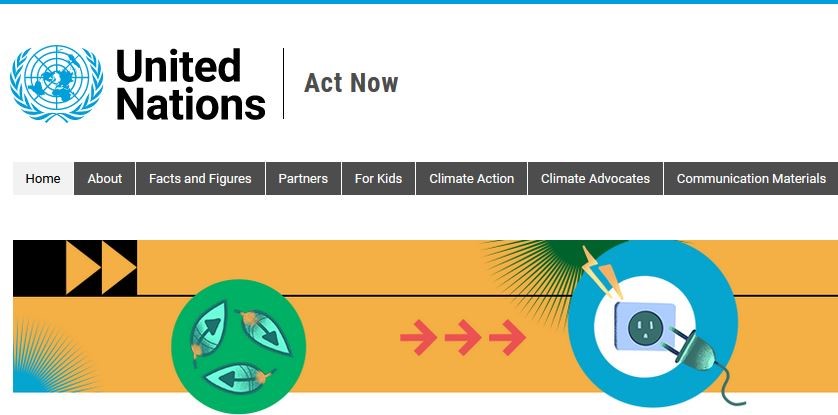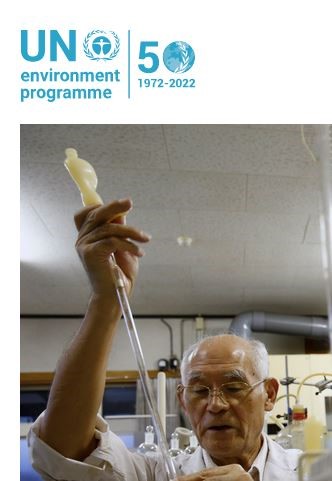DesInventar as a Disaster Information Management System
https://www.desinventar.net/what_is.html
The Disaster Information Management System provides data and analysis related to losses caused by disasters associated to natural hazards. It is a tool that helps to analyze the disaster trends and their impacts in a systematic manner. With increased understanding of the disaster trends and their impacts, better prevention, mitigation and preparedness measures can be planned to reduce the impact of disasters on communities.
Our world in data
This website provides wide range of articles on global problems and global change ranging from demographic change, health, food, agriculture, energy, environment, innovative, technological changes, poverty and economic development, to living conditions, community wellbeing, human rights, democracy, violence and war, education and knowledge.
Green growth index 2020
https://greengrowthindex.gggi.org/wp-content/uploads/2021/03/2020-Green-Growth-Index.pdf
Global Green Growth Institute (GGGI) releases report on green growth index (GGI). GGI is a composite index measuring a country’s performance in achieving sustainability targets including Sustainable Development Goals (SDGs), Paris Climate Agreement, and Aichi Biodiversity Targets for four green growth dimensions–efficient and sustainable resource use, natural capital protection, green economic opportunities, and social inclusion.
Global climate risk index 2021
https://germanwatch.org/sites/default/files/Global%20Climate%20Risk%20Index%202021_2.pdf
The Germanwatch Global Climate Risk Index is an analysis based on one of the most reliable data sets available on the impacts of extreme weather events and associated socio-economic data. The aim is to contextualize ongoing climate policy debates—especially the international climate negotiations—looking at real-world impacts over the previous year and the last 20 years. The index focuses on extreme weather events such as storms, floods and heatwaves rather than slow-onset process such as rising sea levels, glacier melting, ocean warming, or acidification.
UNEP
The United Nations Environment Programme (UNEP) has been the global authority that sets the environmental agenda, promotes coherent implementation of the environmental dimension of sustainable development within the United Nations system and serves as an authoritative advocate for the global environment. The website gathers relevant publications and data about climate action.
ESCAP Environment and Development
https://www.unescap.org/our-work/environment-development
The Economic and Social Commission for Asia and the Pacific (ESCAP) is the most inclusive intergovernmental platform in the Asia-Pacific region. The Commission provides data and reports to promote cooperation among the 53 member States and 9 associate members related to solutions to sustainable development challenges. ESCAP is one of the five regional commissions of the United Nations
OECD: Dataset
The Organization for Economic Co-operation and Development (OECD) is an international organization working to build better policies for better lives. Their goal is to shape policies that foster prosperity, equality, opportunity and well-being for all. OECD databases include charts, maps, tables, collections of data indicators, and publications.
Climate Fast Facts
https://www.un.org/en/climatechange/climate-fast-facts
The website contains ‘fast facts’ which offer information about many aspects of climate change knowledge. The sites highlights the fact that climate change can be a natural process where temperature, rainfall, wind and other elements vary over decades or more. In millions of years, our world has been warmer and colder than it is now which has impact on economy, jobs, finance, energy, health, food and agriculture and nature.
UN Act Now
ActNow is the United Nations campaign for individuals to take action on climate change and sustainability towards achieving net-zero by 2050. Besides wide-ranging actions taken by governments and relevant stakeholders, the transition to a low-carbon world requires the participation of citizens–especially in advanced economies— since everyone can help reduce global warming due to greenhouse gas emission. Making choices that have less harmful effects on the environment, we can be part of the solution and influence change.
Water, Energy, Food, Air & Waste
The Water Food Nexus
The Water Food Nexus Index has been produced annually since 2011, and may be used a means to measure resources and improve sustainability. More recently there have been suggestions that the issue itself is more complex, and this analysis may need to be modified for each particular circumstance
World Food Program
THE World Food Programme is the world’s largest humanitarian organization, saving lives in emergencies and using food assistance to build a pathway to peace, stability and prosperity for people recovering from conflict, disasters and the impact of climate change.
The WHO website has a wealth of data and information relating to hunger fo food security, disaster relief and more
Air Quality:
IQ Air is a website providing searchable real-time information concerning the air quality in cities around the world. These measurements take into account all factors including pollution, and meteological factors.
Waste management
WasteAid : An independent UK charity (non-profit), set up by waste management professionals to share practical and low-cost waste management know-how with communities in low-income countries.
As waste managers, we understand the importance of waste management for public health, and we also know that small enterprises can be successful in turning waste materials into useful products. WasteAid began in 2015 to share know-how and skills with communities
Around 1 in 3 people globally don’t have decent waste management. Pollution caused by waste harms people’s health and the environment, and damages the local economy. In contrast, an affordable waste management system is relatively simple to implement, improving the environment, creating jobs and protecting public health – particularly for children.
ASEAN
ASEAN’s Joint Statement on Climate Change to the 26th Session of the Conference of the Parties to United Nations Framework Convention on Climate Change (UNFCCC COP 26): https://asean.org/wp-content/uploads/2021/10/10.-ASEAN-Joint-Statement-to-COP26.pdf
The ASEAN joint statement on climate change for the 26th session of the Conference of the Parties to United Nations Framework Convention on Climate Change (UNFCCC-COP) was adopted in Brunei Darussalam on 26th October 2021 COP26 was co-hosted hosted by UK and Italy and held in Glasgow in November 2021. ASEAN Member States expressed desire to support UNFCCC and the Paris Agreement through formulating long-term low GHG emission development strategies based on scientific research. As a diverse group of nations the principle of common but different responsibilities and respective capabilities (CBDR-RC) as mentioned within their respective Nationally Determined Contributions (NDCs).
- ASEAN State of Climate Change Report 2021 https://asean.org/wp-content/uploads/2021/10/ASCCR-e-publication-Final-12-Oct-2021.pdf
The ASEAN State of Climate Change Report (ASCCR) provides an overall outlook of the challenges and current commitment towards the United Nations Framework Convention on Climate Change (UNFCCC) and the Paris Agreement (PA) as well as state of play of climate change issues in the ASEAN region. This forward-looking report includes methodology to assess the current progress of actions and the need to strengthen actions through 2030 and on to 2050 based on the concepts of “transparency” and “transformation”. As well it considers ASEAN’s development context and the long-term ambition of the PA goals of limiting global average temperature increase to well below 2 degrees Celsius (°C), preferably to 1.5°C, compared to pre-industrial levels.
- ASEAN Center for Energy https://aseanenergy.org
ASEAN Centre for Energy (ACE) represents the 10 ASEAN Member States’ interests in the energy sector. ACE implements the ASEAN Plan of Action for Energy Cooperation, which serves as a blueprint for better co-operation and energy initiatives. Keeping regional development sustainable and environmentally friendly is an important concern for ASEAN’s energy sector. The site contains reports and infographics detailing the energy resources of each member state.
- ASEAN Energy Database System https://aeds.aseanenergy.org
ASEAN Energy Database System (AEDS) contains official ASEAN statistical data, related energy news and policies for each member state.
- ASEAN Climate Change and Energy Project https://accept.aseanenergy.org/
ASEAN Climate Change and Energy Project (ACCEPT) is a platform sharing country profiles, project activities and updates for climate change mitigation policies collected via the ACCEPT Research Database Submission Form. It also shares publications on energy and climate change.
- ASEAN Hydroinformatics Data Center www.aseanwater.net/wp/
ASEAN Hydro-informatics Data Centre (AHC) assists Water and Disaster Risk Management within ASEAN Member States. It shares best-practices via a knowledge sharing hub on weather and hydrology together with scientific models for data integration, analysis, monitoring and implementation in spatial and non-spatial formats.
- ASEAN Risk Assessment Center for Food Safety www.arac-asean.org
ASEAN Risk Assessment Center for Food Safety (ARAC) is directed by the ASEAN Health Ministers Meeting (AHMM) and guided by the Senior Officials Meeting on Health Development (SOMHD) ARAC provides an integrated food safety risk assessment mechanism in the region. The site includes working documents, as well as scientific committee and panel formation reports
- ASEAN Disaster Information Network: https://adinet.ahacentre.org/
ASEAN Disaster Information Network (ADINet) is the online facility for recording and tracking disasters in the ASEAN region operational since 2012. It records events, the types of hazards, populations impacted, as well as the cost of damage.
- ASEAN Specialized Meteorological Center http://asmc.asean.org/asmc-supported-browsers/ ,
ASEAN Specialized Meteorological Center (ASMC) is the rich resources collection of region transboundary haze, weather and climate events, both in spatial and non-spatial manner. The site includes satellite imageries, hotspot information, and stations monitoring air quality and meteorological models.
- ASEAN Data Portal Indicators: https://data.aseanstats.org
ASEAN Stats Data Portal Is a repository for ASEAN statistical databases. The data sources are mostly from regularly updated data submitted by ASEAN Member states, using ASEAN Statistical Indicators – Consolidated Template (ASI-CT), under the direction of the ASEAN Community Statistical System (ACSS) Committee The data is provided by indicators covering Foreign Direct Investment (FDI), International Merchandise Trade (IMT), Macroeconomic, SDG, International Trade in Services (ITS), Transport, Visitor Arrivals and Labour. Dashboards illustrate details of ASEAN visitor arrivals and trade in goods (IMT).
- ASEAN Biodiversity Dashboard https://experience.arcgis.com/experience/2ffc8feeafab47c8a6dcf9e88436e37c/page/About/
ASEAN Biodiversity Dashboard is the interactive spatial platform demonstrating biodiversity data such as species occurrence, species, protected areas and heritage parks, habitat and relevant indices.
- ASEAN Center for Biodiversity http://bim-mirror.aseanbiodiversity.org/dashboard/mapgallery.php
ASEAN Center for Biodiversity has developed Biodiversity Information Management (BIM) dashboard which is integrated database, online web service, resources and data analytics as well as integrated publishing toolkit for searching.
- Asian Disaster Reduction Center (ADRC) https://www.adrc.asia/
Asian Disaster Reduction Center (ADRC) works to promote multilateral network building to improve disaster risk reduction (DRR) capacity, including enhancement of DRR-related personnel exchanges in Asia.
